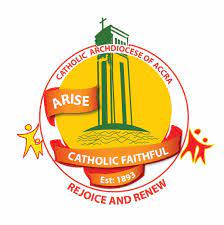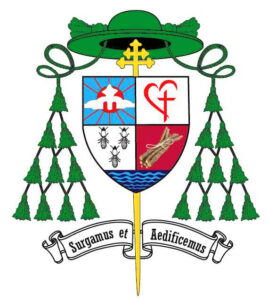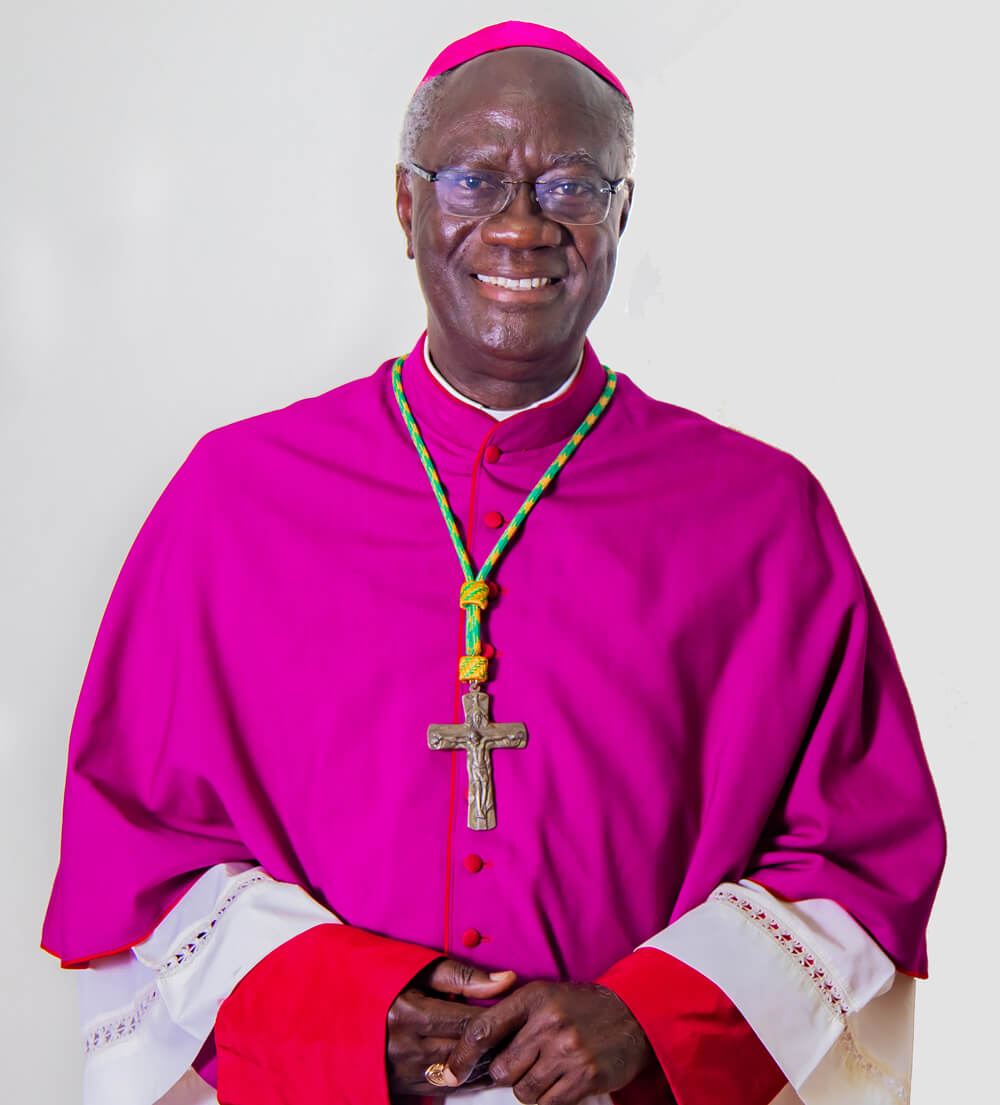With the creation of new Deaneries for effective administration in Ghana’s Catholic Archdiocese of Accra, the Most Rev. John Bonaventure Kwofie, CSSp, has called on the Clergy and people of God to come together to work for the salvation of souls.
“Let us all put our shoulders to the wheel and work together for the good of the Church and the salvation of souls,” the Archbishop said in a message notifying the Clergy and People of God in the Accra Archdiocese of the creation of new Deaneries and the suppression of Tema-Battor Deanery.
According to Archbishop Kwofie in a December 27 notification message, “With the creation of these new Deaneries, which takes effect from January 1, 2022, the old Tema-Battor Deanery would be suppressed on the same date.”
He noted that “The purpose of this arrangement is to assist the Bishop to effectively administer his Diocese, adding, “The head of the Deanery is the Dean.”
“After consultation with the Council of Priests and the College of Consultors, the current Tema-Battor Deanery has been split into three Deaneries. They are: Tema Deanery, Battor-Ada Deanery, and Ashaiman Deanery,” the Archbishop said.
The Archbishop’s message explained that “Church Law gives Bishops the authority to assemble parishes into smaller geographical groups within a Diocese called Deaneries Canon 374 §2 states: “To foster pastoral care through common action, several neighbouring parishes can be joined into special groups, such as a vicariate forane, or deanery.”
According to the message dated December 27, the three new Deaneries would consist of churches and their respective outstations if any, hence the number of Deaneries in Accra Archdiocese is now eight, namely; Osu Deanery, Kpehe Deanery, Kaneshie Deanery, Mamprobi Deanery, Madina Deanery, Terna Deanery, Battor-Ada Deanery and Ashaiman Deanery.
The new Tema Deanery would have the following parishes, Our Lady of Mercy Parish, Tema Com. 1; Good Shepherd Parish, Tema Com. 2; St. Joseph the Worker Parish, Tema Com. 8; Corpus Christi Parish, Sakumono; St. Bakhita Catholic Church, Lashibi; St, Raphael the Archangel Catholic Church, Lashibi; All Saints Catholic Church, Terna Com. ll.; and St, Peter, Tema New Town. The Dean is Very Rev. Fr. Felix Sesenyo Quarshie.
Parishes under the new Battor-Ada Deanery are St. Peter Claver, Ada Foah; St. Mary Catholic Church, Koluedor; St. Martin de Porres, New Dawhenya; St. Joseph the Worker Catholic Church, Vume; St. Dominic Guzman Catholic Church, Dawhenya; St. John the Baptist Catholic Church, Prampram; and St. Maria Goretti Catholic Church, Battor. The Dean is Very Rev. Fr. Gabriel Ettiene Alhassan.
For the new Ashaiman Deanery, it has St. Dominic Savio Catholic Church, Afienya; St. Theresa of the Child Jesus Catholic Church, Gbetsile; St. Augustine Catholic Church, Ashaiman; St. John Vianney Catholic Church, Asutsuare; St. John Bosco Catholic Church, Golf City; St. Luke the Evangelist Catholic Church, Ashaiman – Lebanon; St, Andrew Catholic Church, Kordiabe; Blessed Clementina Catholic Church, Ashaiman — Middle East; St. Michael Catholic Church, Michel Camp; and Holy Trinity Catholic Church, Adjei-Kojo with Very Rev. Fr. Henry Kwame Duah, SVD as the Dean.
He thanked the priests and other collaborators in these Deaneries and congratulated the newly appointed Deans.

The Accra Archdiocese during the reign of the late Archbishop Dominic Kodwo Andoh had three deaneries before his retirement in 2005, namely Accra East, Accra West and Tema-Battor. When Archbishop Charles Gabriel Palmer-Buckle succeeded Archbishop Andoh in 2005, in consultation with the Clergy and people of God after the Second Archdiocesan Synod held in 2009, created new deaneries making the number of deaneries six for effective administration.
Hence, to further effectively administer the Archdiocese necessitated the creation of new deaneries from the Tema-Battor Deanery by Archbishop Kwofie.
Meanwhile, the Deans appointed by Archbishop Kwofie in November last year for the existing deaneries of Osu, Madina, Kaneshie, Mamprobi and Kpehe, Madina still remain as Deans. They are Rev. Fr. John Kobina Amoah, Osu Deanery; Rev. Fr. Nimorius K. Domanzing, SMA, Madina Deanery; Rev. Fr. Peter K. Atsu, Kaneshie Deanery; Rev. Fr. Anthony Opong, Mamprobi Deanery and Rev. Fr. George Obeng Appah – Kpehe Deanery.
A Dean in the Catholic Church is a priest appointed for five (5) years holding certain positions of authority in a deanery, a subdivision of a diocese. He is to watch over the clergy of the deanery, to see that the orders of the Bishop fulfilled.
In the most recent Code of Canon Law, Bishops were given the authority to assemble parishes into smaller geographical groups. These groups of parishes within a diocese were then put under the care of a “dean” and called “deaneries.” The word “dean” is derived from the Latin decanus, originally referring to a leader in charge of ten people.
The purpose of this arrangement is to assist the Bishop in his administration of the diocese. Often a diocese is a large geographical region and in order to govern the diocese effectively, the Bishop needs deans to help oversee the parishes and ensure they are functioning properly.
In some cases, when the Bishop is not able to physically be present for an important ecclesial event, the dean will be appointed as his representative. For example, a dean may be asked by the Bishop to install a priest as the new “pastor” of a parish.

While deans do not have much official authority to enact legislation in parishes, they are the local representatives of the Bishop. If there is an issue with a parish or priest, lay people are instructed to consult the local dean first. Then, if the issue is not resolved, the dean is supposed to present the problem to the Bishop.
In areas where there are many Catholics stretched over a large area, deaneries are an effective tool that help the Bishop maintain unity among his flock.
Under canon law, the Bishop has the ability to group parishes into regional areas within a diocese, according to their geographic location. These regions are called deaneries.
Deans are priests who act as the overseer of a deanery appointed to them by the Bishop. A dean’s main task is to first and foremost provide support to the faithful and priests of his deanery, but also to act as a liaison between the activities of his deanery and the Bishop.
According to canon 555 in the Code of Canon Law, a dean is “a close collaborator with the Bishop in the pastoral care of the faithful and attentive ‘elder brother’ towards the priests of the deanery…It falls to him to coordinate the common pastoral activity of the parishes, to see to it that the priests are living lives in conformity with their state and that parochial discipline is duly observed, particularly with regard to the liturgy.”
Deans, though they do not possess the same power of governance as the principal Vicars or bishop of a diocese, are able to vicariously exercise pastoral authority on behalf of the bishop over their own deanery. As such, deans are often asked to carry out tasks normally reserved for the bishop or principal Vicars, such as administering the sacrament of Confirmation or performing an installation ceremony of a new pastor.



